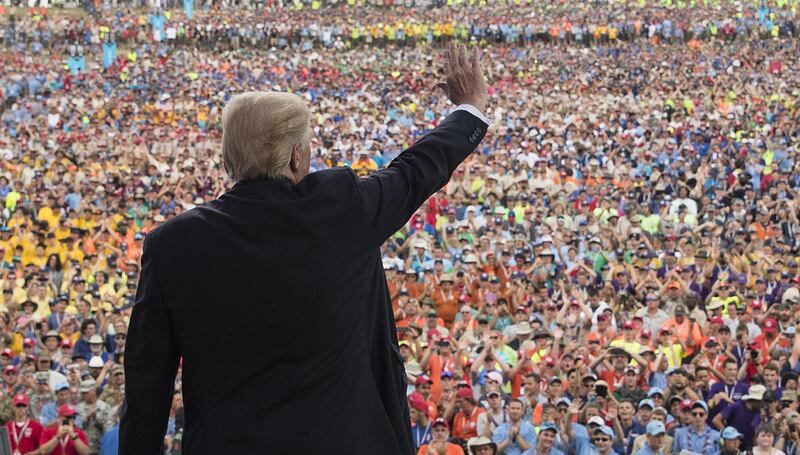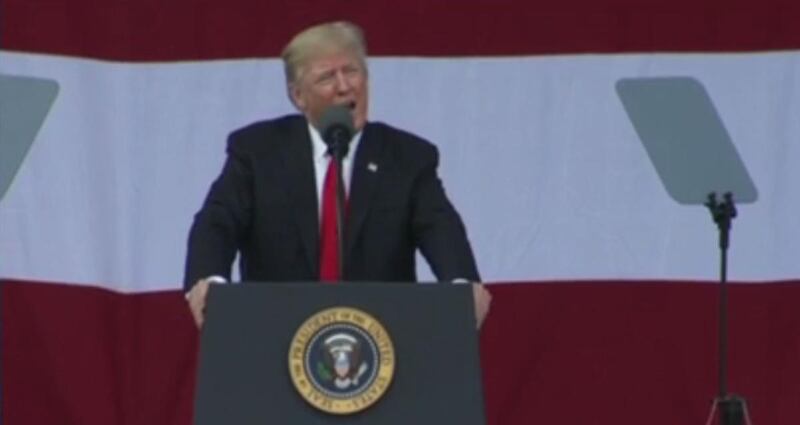SALT LAKE CITY — Whether you think President Donald Trump's debunked story about getting a compliment from the head of the Boy Scouts is a huge deal or a tempest in a teapot probably depends on what you think of Trump's politics, a new study from the University of Illinois at Chicago suggests.
White House spokeswomen Sarah Huckabee Sanders scrambled this week to explain two phone calls that never happened, one allegedly from the president of Mexico, the other from the leader of the Boy Scouts of America.
In an interview with the Wall Street Journal published Tuesday, Trump spoke of his controversial speech to thousands of Scouts at the organization's National Jamboree on July 24. "I got a call from the head of the Boy Scouts saying it was the greatest speech that was ever made to them, and they were very thankful."
"We are unaware of any such call," the Boy Scouts responded in a statement on Wednesday. In fact, the Boy Scouts had actually issued a detailed apology for the president's political speech.
Sanders acknowledged the call didn't take place. But how do reports of politicians distorting the truth affect voters?
The Illinois study found that voters on both sides of the aisle are likely to discount untruths told by politicians they like in defending objectives they share. Researchers showed quotes to study participants from opponents and supporters of federal Planned Parenthood funding. Told that the statement was either true or false, the participants were asked to evaluate the statement and then indicate their own views on the issue.
People support politicians despite untruthful statements "because those lies are perceived by supporters as an acceptable and perhaps necessary means to achieve a higher moral end,” Allison Mueller, a doctoral candidate in psychology and lead author of the study, said in a statement.
“The findings also suggest that, although people are not comfortable excusing others for heinous crimes that serve a moralized end, they appear comparatively tolerant of norm violations like lying,” she said.
The gist of the University of Illinois study was echoed this week by Jay Nordlinger at the conservative National Review. Many Trump supporters don't seem to care about the president's untruths, he notes.
"A couple of months ago," Nordlinger writes, "a longtime conservative said to me, 'I don’t care whether he lies.' Trump bludgeons the (mainstream media) and drives the Left crazy, and that was good enough for her. During the campaign, another longtime conservative said to me, 'He’s not a liar, he’s a bulls------ — there’s a difference.'"
In fact, philosophers and political scientists do recognize the expletive Nordlinger quotes as a category distinct from a liar, but not everyone agrees that the former is more harmless than the latter.
Princeton philosophy professor Harry G. Frankfurt wrote, in a 2005 book on the subject, that someone who falls under the category described by the expletive "does not reject the authority of the truth, as the liar does, and oppose himself to it. He pays no attention to it at all. By virtue of this, bulls--- is a greater enemy of the truth than lies are."
"I wouldn't say it was a lie," Trump spokeswoman Sanders said when asked about Trump's claim of getting a call from the head of the BSA, CBS News reported. "That's a pretty bold accusation. The conversations took place, they just simply didn't take place over a phone call."
But, Sanders admits, the conversations did not involve the head of the organization, either. Sanders said instead that "multiple members of the Boy Scouts leadership following his speech there that day congratulated him, praised him and offered quite powerful compliments following his speech."
The misstatement on the Boy Scouts was one of two Sanders was forced to defend this week.
In a Cabinet meeting on Monday, Time reported, Trump defended his immigration policy. "Even the president of Mexico called me," he said. "Their southern border, they said very few people are coming because they know they're not going to get to our border, which is the ultimate compliment."
Sanders said in this case the quote came not from a phone call but during a one-on-one conversation between the two men at the G20 meeting in Hamburg, Germany, in early July.
To be fair, Democrats are hardly immune to telling whoppers to win a policy debate or burnish their credentials.
The mainstream Factcheck website Politifact awarded President Barack Obama its "lie of the year" award in 2013, for his broken promise, "If you like your health care plan, you can keep it." Obama made that promise 37 times in 2009 and 2010, Politifact notes.
But in late 2013, insurance companies began sending mass cancellation notices to their clients because the existing plans did not meet detailed requirements spelled out in the Affordable Care Act. This, as NBC reported at the time, was foreseen by the Obama administration, making the president's 2009 and 2010 assurances troubling.
And in 2008, then Sen. Hillary Clinton, running for the Democratic presidential nomination, told audiences of a harrowing visit to Bosnia as first lady that didn't quite happen that way.
“I remember landing under sniper fire," Clinton said. "There was supposed to be some kind of a greeting ceremony at the airport, but instead we just ran with our heads down to get into the vehicles to get to our base."
Washington Post fact checker Glenn Kessler disproved her story. "Had Hillary Clinton’s plane come 'under sniper fire' in March 1996," Kessler wrote, "we would certainly have heard about it long before now. Numerous reporters, including The Washington Post’s John Pomfret, covered her trip. A review of nearly 100 news accounts of her visit shows that not a single newspaper or television station reported any security threat to the first lady."
Kessler also noted video footage that showed Clinton calmly leaving the military transport plane that day. Kessler awarded Clinton four Pinocchios for the tale.
Email: eschulzke@deseretnews.com



